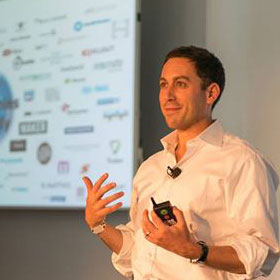In 1999, the Wachowski Brothers released The Matrix, set in a dystopian future where software governs the world and humans are bred into captivity. I recently watched the movie again, fifteen years later, and a new thought came to mind. In the movie, humans ended up in a predicament after losing a war to the machines. In real life, I think there is a chance that we will opt into it.
Today’s Wall Street Journal features a parent’s firsthand account, “Returning from work every evening, I would find two zombies — the cliché never gets old, because it is accurate — in front of the computer. In a catatonic state, the children would respond to my greeting with an unintelligible mumble.”
But it is not just children. We all rely on software, whether it is to fly planes, drive cars, measure vital signs, or deliver medicine. Software often requires some amount of human intervention – for instance, the automatic-shifting, power-steering, cruise-controlling, collision-avoiding car *still* requires someone to hold the wheel and occasionally push a pedal. But even that minimal amount of human interaction is going away soon.
Parents lament that their children spend so much time in front of a computer. I have seen a glimpse of the future and this trend is not going to get any better. Game designers are hiring psychologists to perfect the Skinner-Box-Game-Genre, which produces endless, addictively stimulating games. Soon enough the game will be attached directly to your face with an Oculus virtual reality headset. Then life becomes about virtual goods, purchased with virtual credits, which are debited from a virtual paycheck, that was virtually deposited in your bank account.
Food seemed to be like a final frontier – I thought no one would voluntarily give up solid food and consume tasteless nutrients through a tube. But maybe I was wrong. At first I thought this was a joke, but then I saw that Andreeson Horowitz funded it. While software is busy eating the world, the world is busy eating Soylent.
Optimists will say that all this automation enables us to save time. Pessimists will say that it enables more work to be done by fewer people. My favorite video on this topic is “Humans Need Not Apply.” It is the best 15 minutes you will spend on YouTube this month. Ironically, I just clicked on it when writing this post and the preview ad was for a Dyson self-driving vacuum.
The perverse reality is that people plug in in order to “unplug.” Come home, sit in front of the television, veg out. Perhaps play a game on your phone, shop on your iPad, listen to music, and text friends.
And the result is that we are getting lonelier and lonelier. And that is what troubles me most about all of this new technology.
So here is a thought experiment: when we spend too much time with machines it makes us feel lonely. Yet, to avoid being alone, we spend more time with machines. This is the crux of why I think the end state for humanity may not be so promising.

Ian Sigalow
http://sigalow.comIan is a co-founder and partner at Greycroft Partners in New York City. He has been a venture capitalist since 2001.
AUTHOR 101010101010101
Posted on 4:38 pm September 11, 2014.
http://continuations.com/post/86513198690/computers-and-wages-the-great-divergence